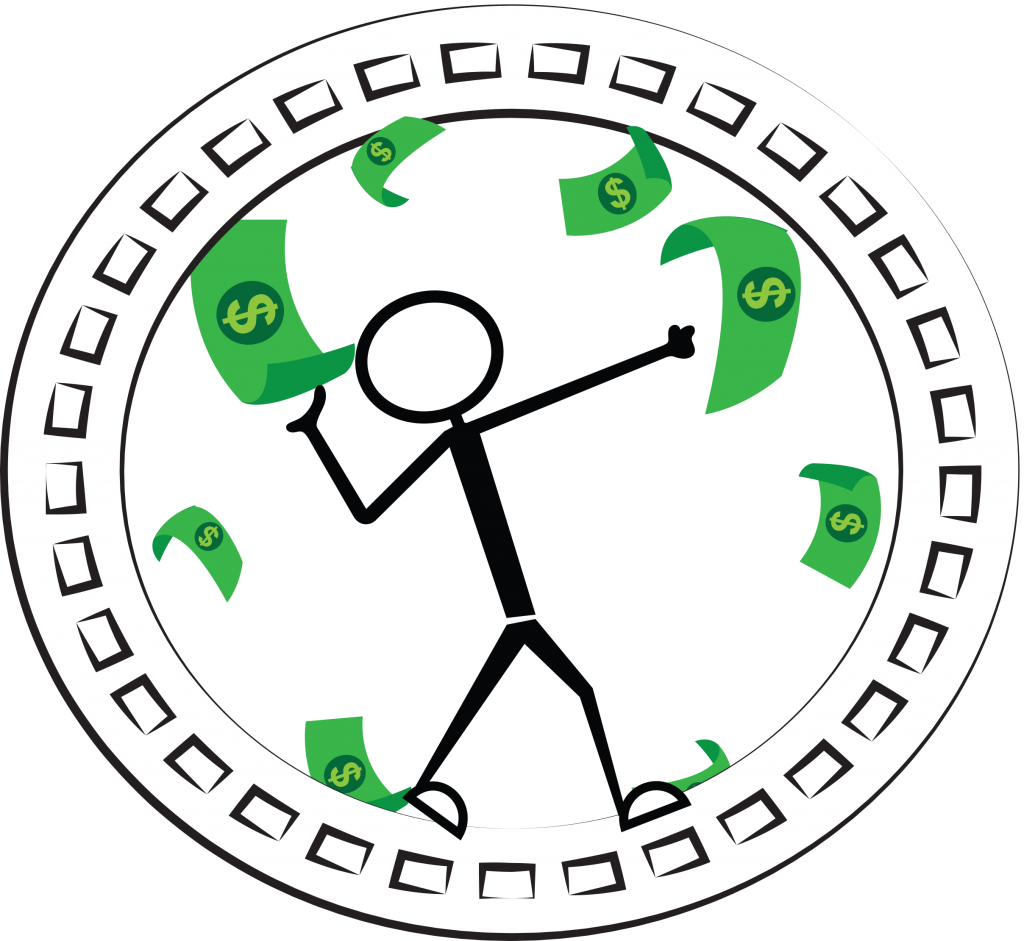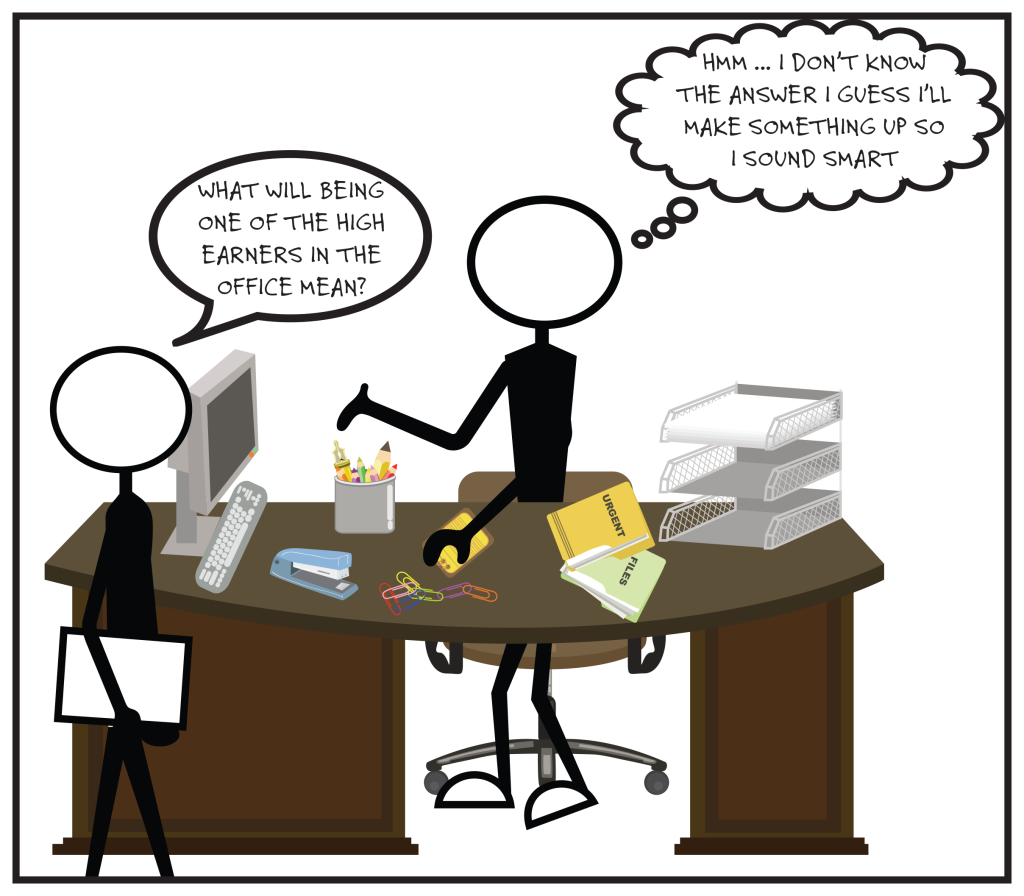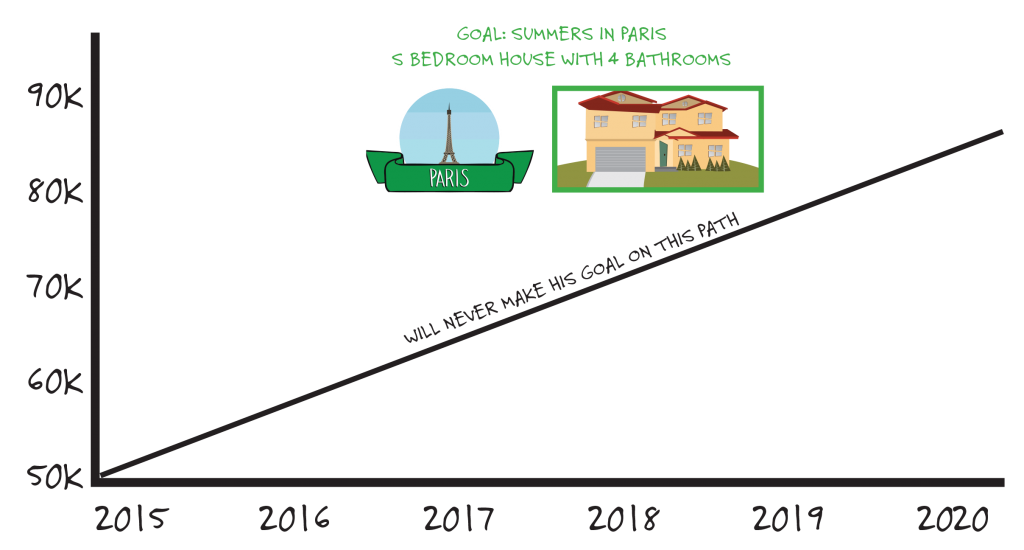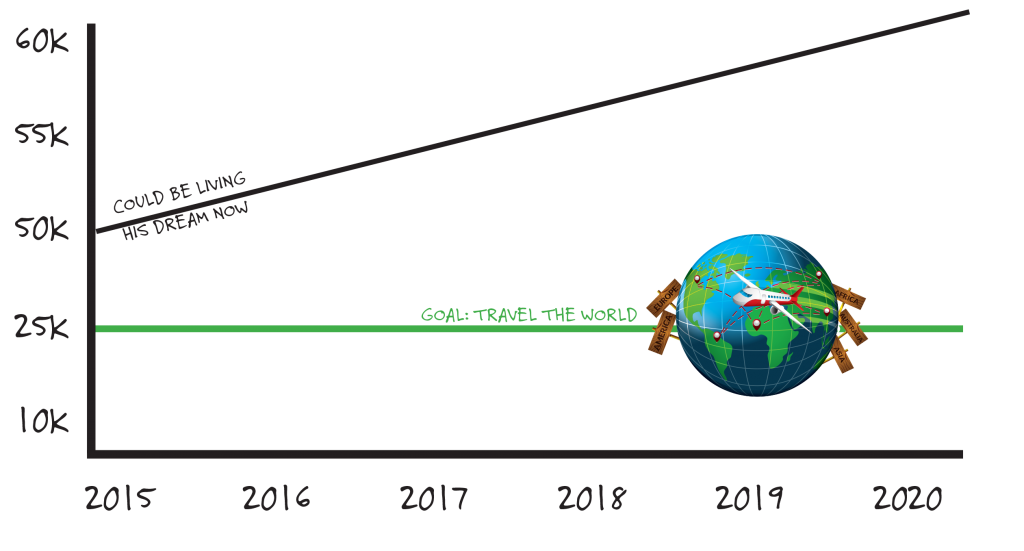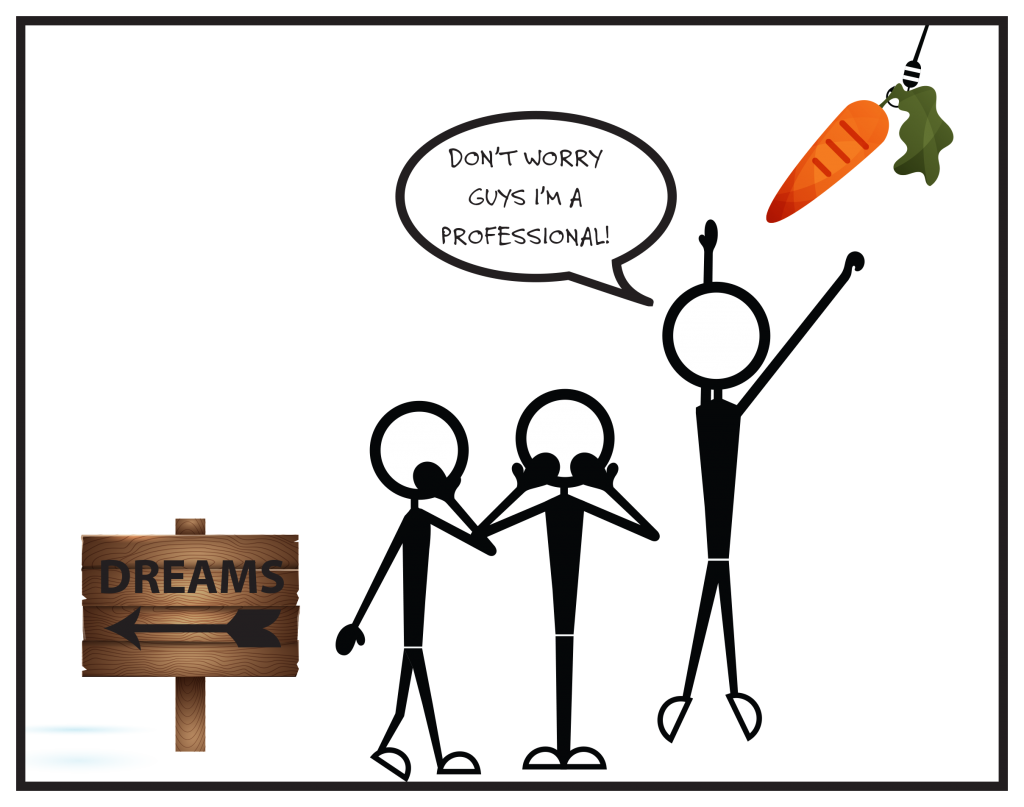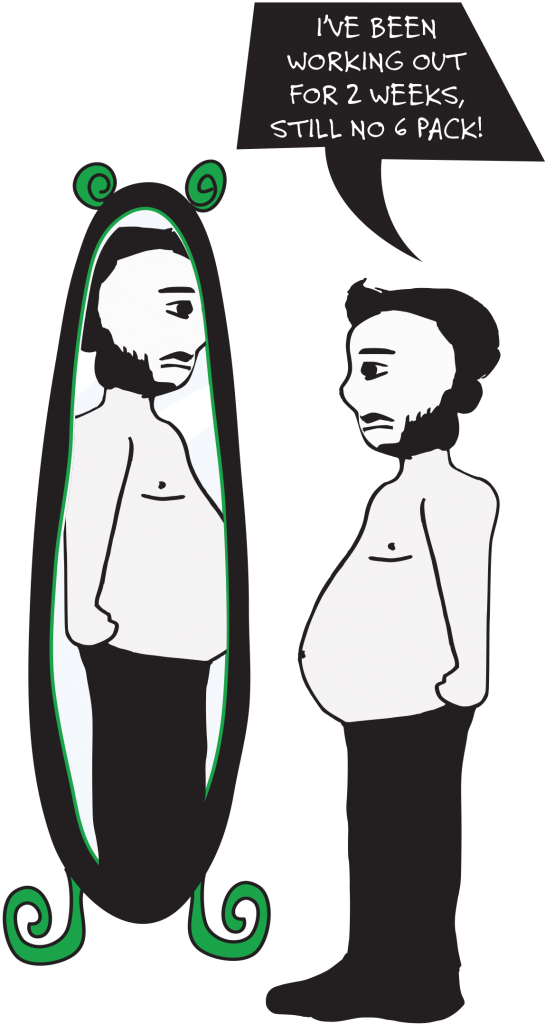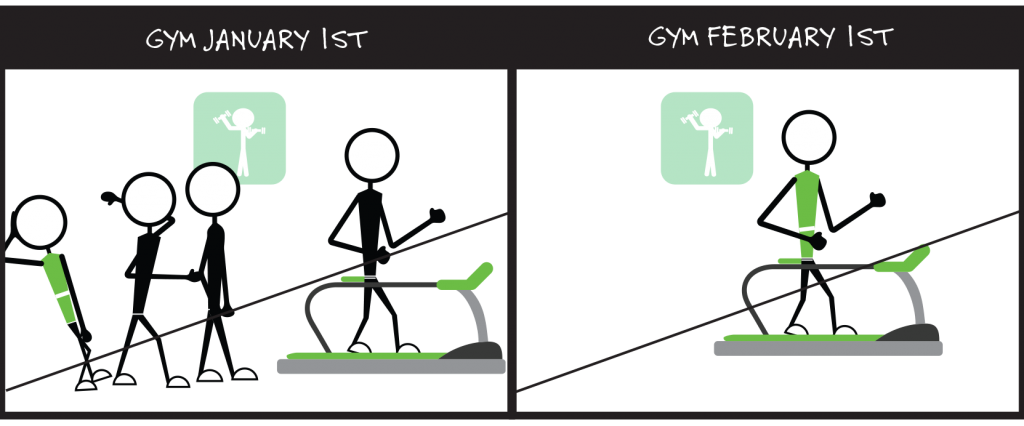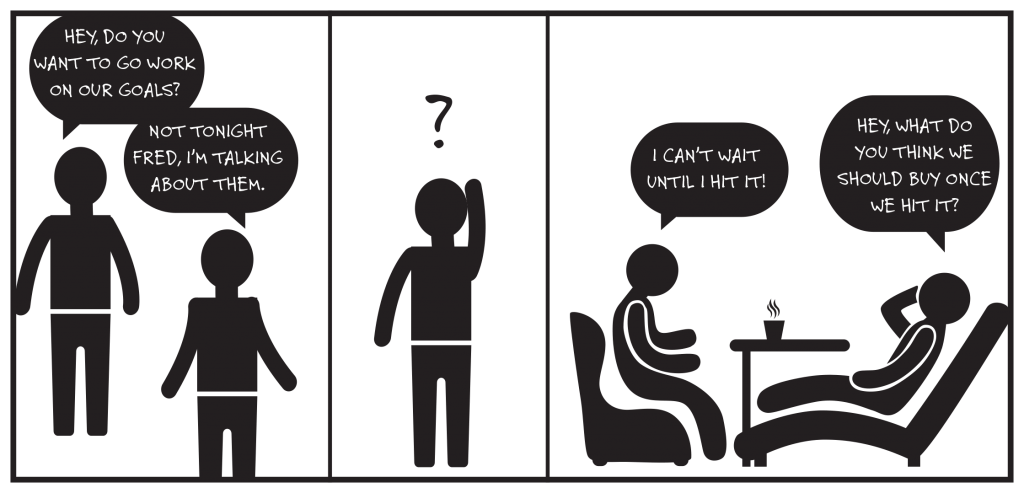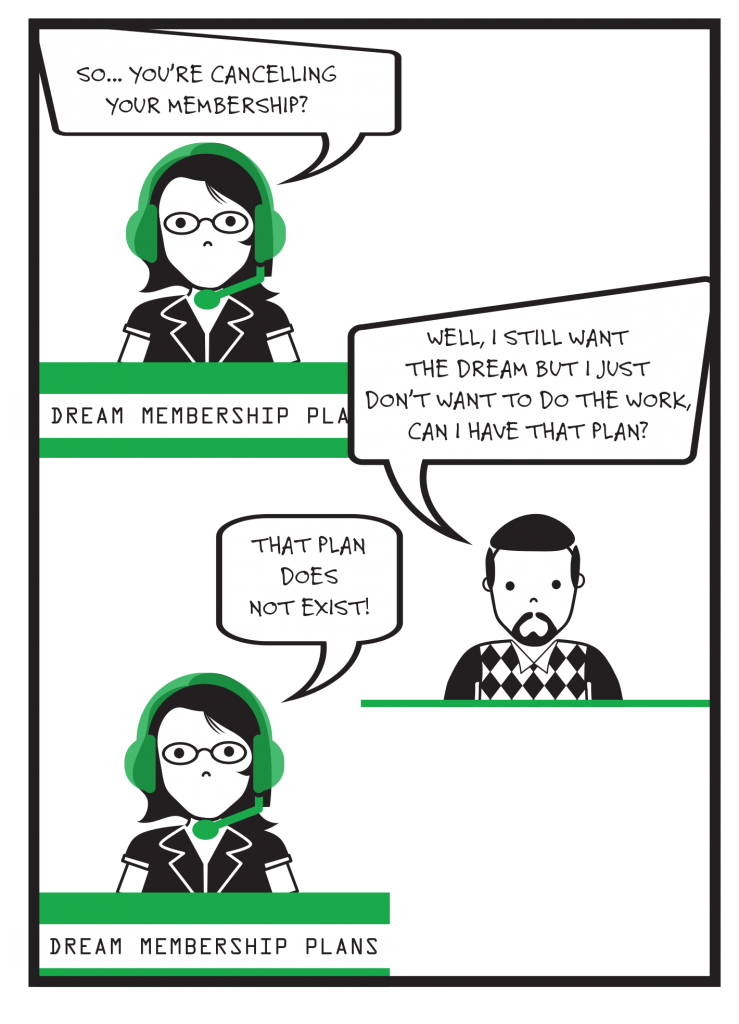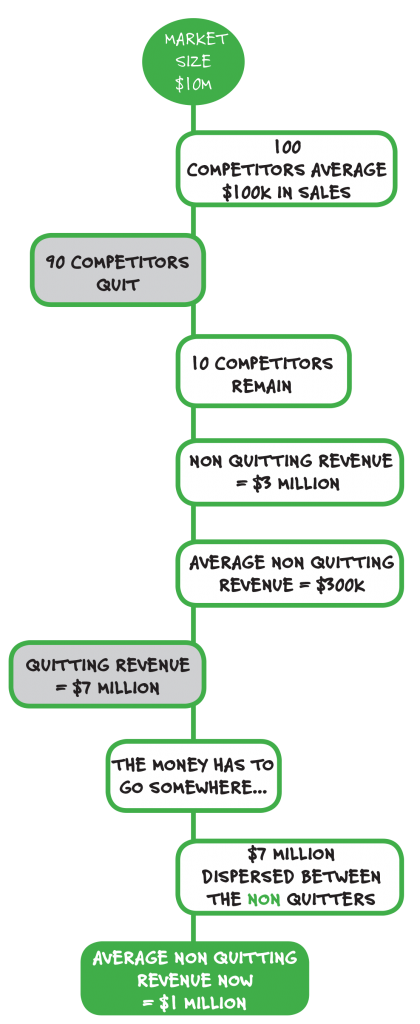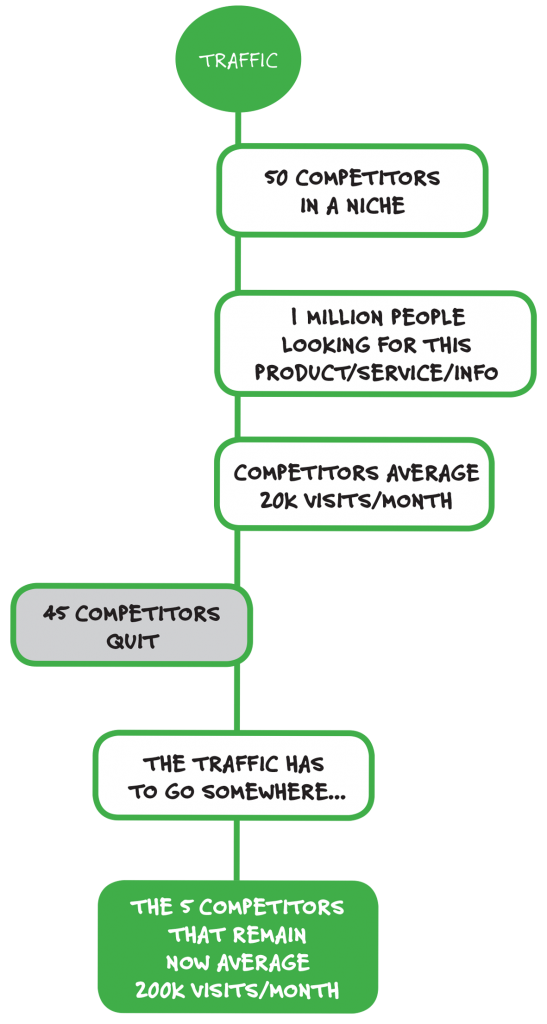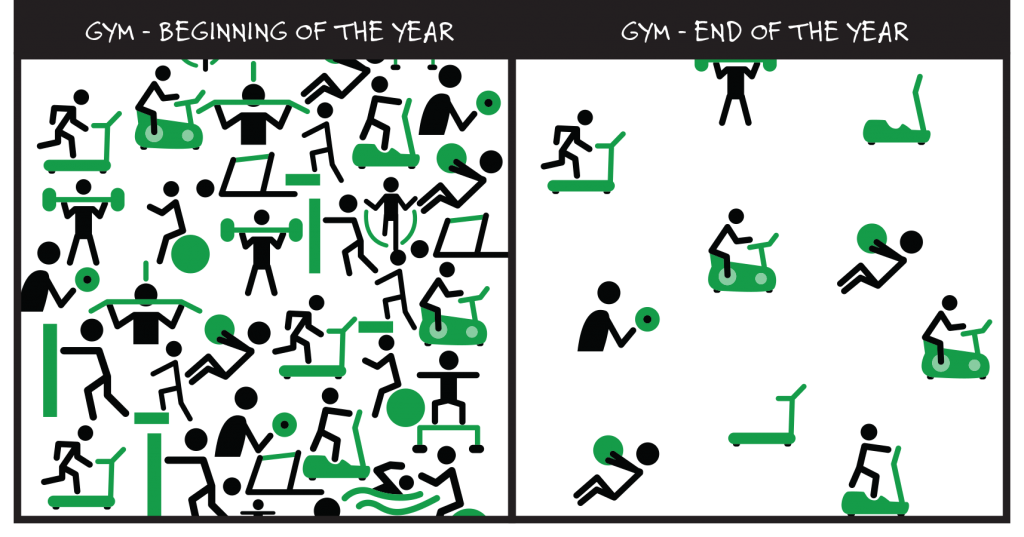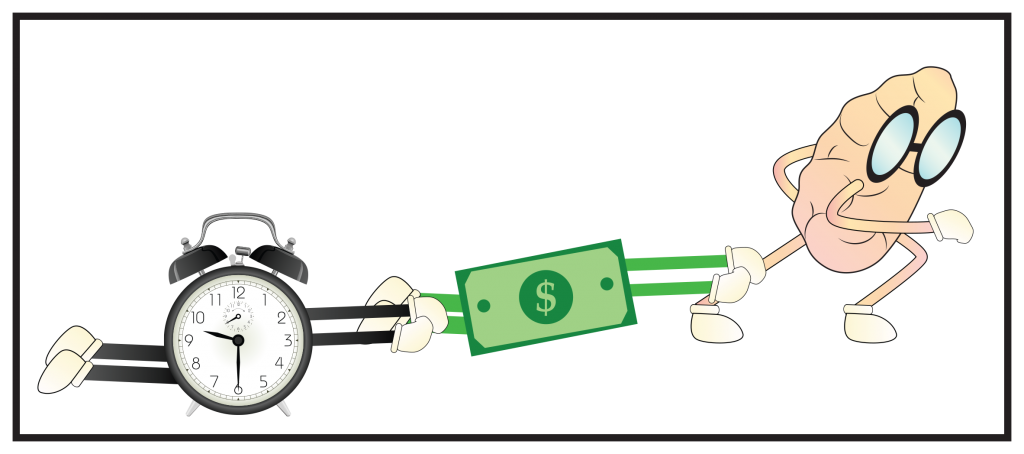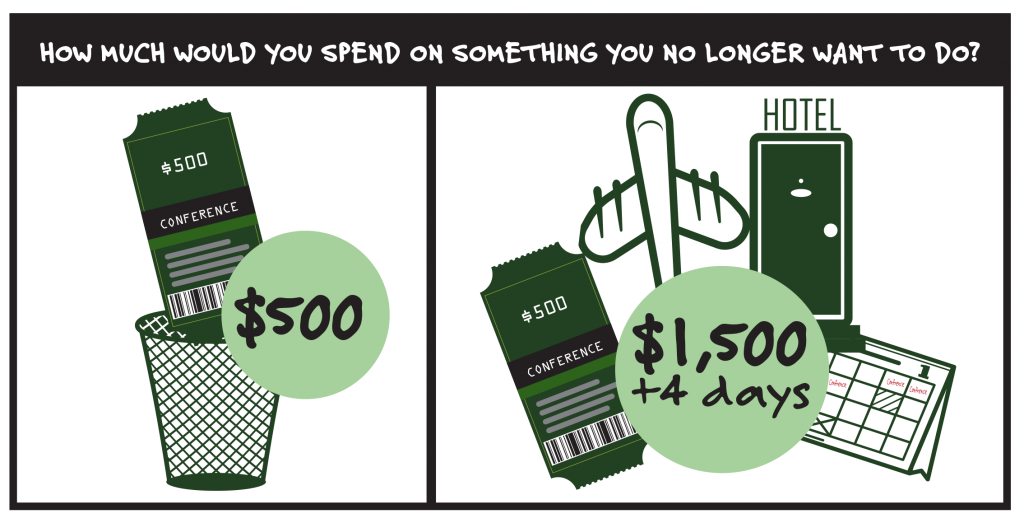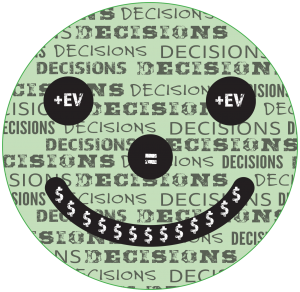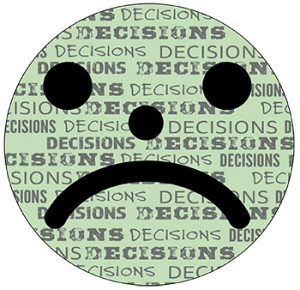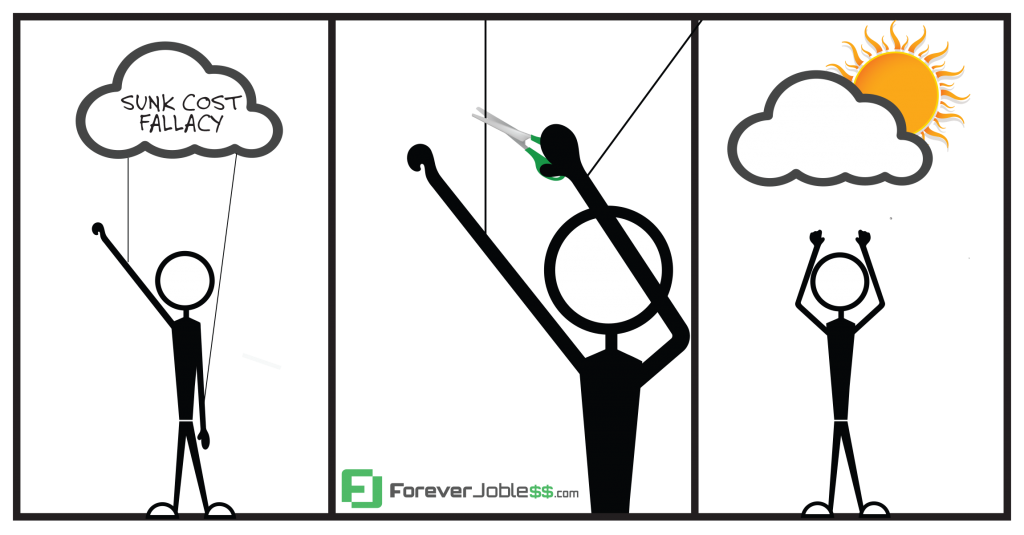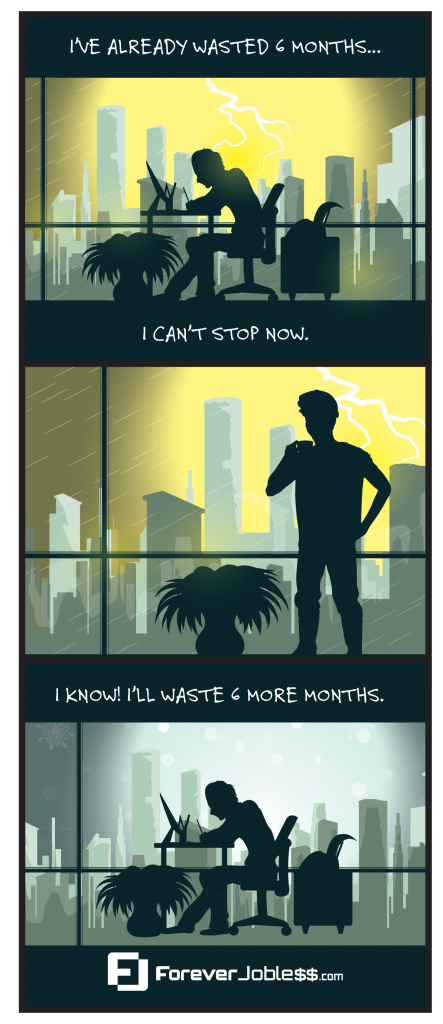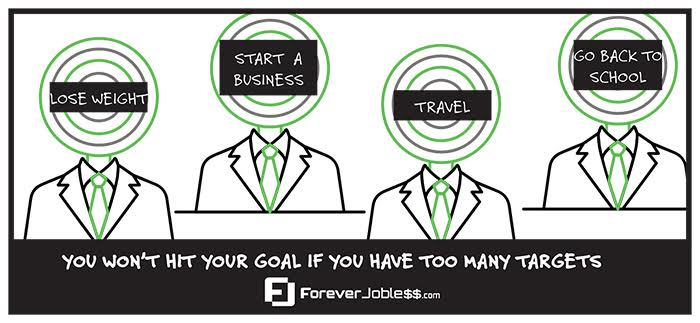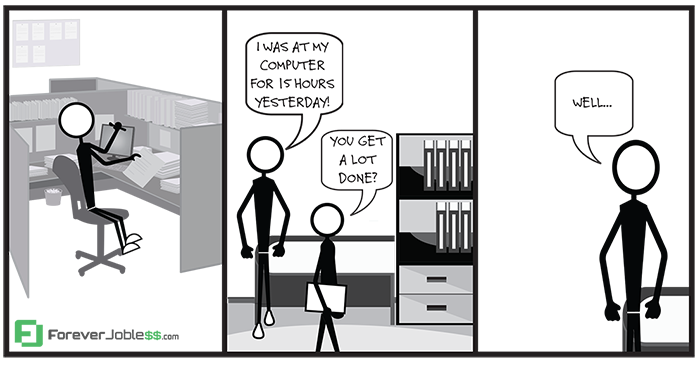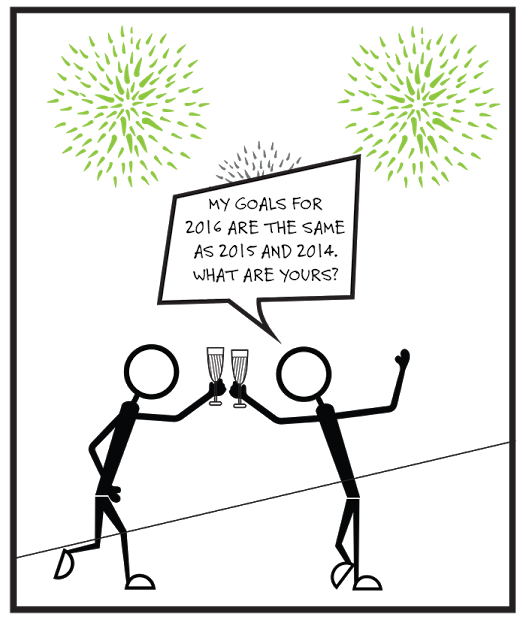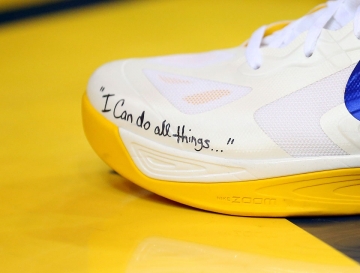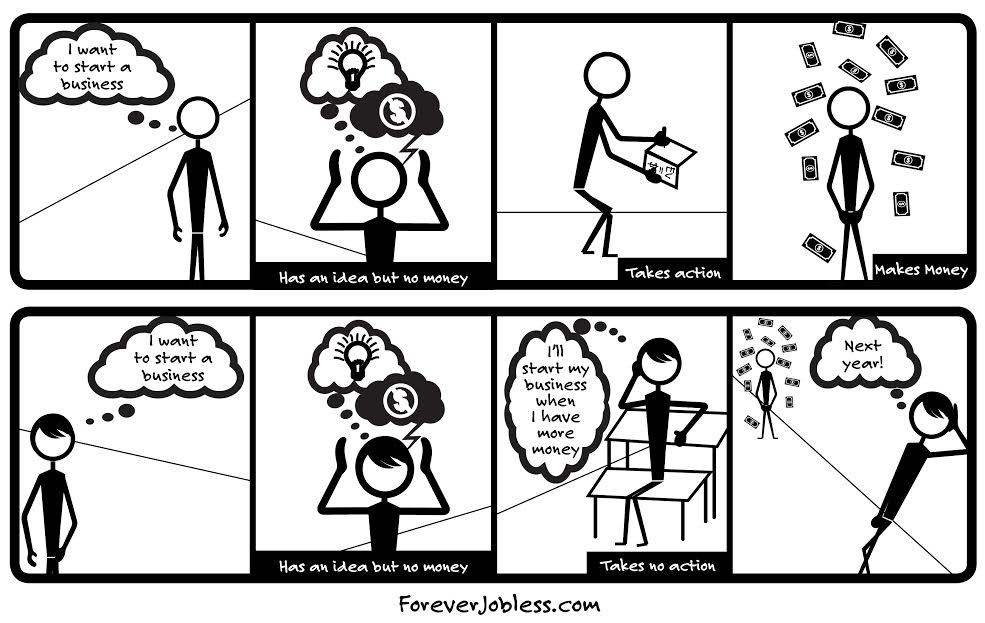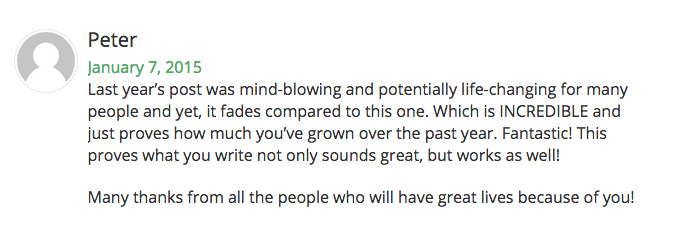
How did you do at accomplishing the goal you set out for yourself last year?
If you’re like most people, you failed. The same thing will happen with your goal this year unless the way you go about accomplishing it changes to a way that guarantees your success.
You probably still don’t have that type of a plan in place for this year.
Let’s change that.
See, I used to fail at my goals too. Sometimes I wouldn’t even get the opportunity to fail, I didn’t even know where to start, or I’d start without a good system in place, and a few months into the year I wouldn’t even be able to remember what the heck my goals even were.
A year ago I wrote a post about how I fixed that, and other strategies I was trying to implement to keep improving on my ability to hit my goals:
The Definitive Guide To Accomplishing Your Goals
Over the last year I’ve tweaked my strategy slightly for what I thought worked better for me. The principles are the same, I’ve just subtracted some things and added others, as I experiment, fail, succeed, and learn more.
The most important thing that I stressed last year, and will stress even more this year, is that you HAVE to pick one main goal, and focus on that. If you have a bunch of goals, they’re not actually goals, they’re dreams, as you won’t do what you need to do on a daily basis to form the necessary habits to achieve a goal.
You can dream dreams, or plan goals. One will lead you to success, the other will lead to unhappiness that you’re never achieving your dreams.
It’s exciting to dream. I love it just like anyone else. The problem is, it often confuses you to thinking you’re doing something about attaining it. Setting a goal that would allow you to live that dream, and following a process that guarantees goal achievement- that is what will allow you the chance to bring dreams to reality. Dreaming is great, but only in a small enough dose to motivate you to set a goal. Any more than that and dreaming just becomes a distraction from achieving the goal, that will let you achieve the dream.
Set a goal that would help you achieve other goals. If you have five related goals, which goal makes the other goals easier? That becomes your main goal.
Goal Diversification is Bad
If you attempt to do all your goals at the same time, even if they are related, you’re going to hurt the chance of achieving all of them.
Most people diversify in business, even though they shouldn’t. I wrote a post explaining why:
Entrepreneurial Diworsification
Most people diversify on their goals too. Don’t do that.
When I sucked at goal achievement I would do that too. I used to set 10 new years goals. Well, all I was doing was setting up 9 distractions to whatever my #1 priority goal was. As a byproduct, none of them got done, or at best the easy/non life-impacting goals got done.
If you did nothing except followed this one piece of advice for your goal setting, you’d immediately have an edge on most people.
My main goal last year revolved around fitness.
Focusing on this one priority goal allowed me to achieve pretty extreme results

Photo with Kamilah Powell
I’m a normal person just like you. All I did was set the goal, figure out what I’d need to do on a daily basis to achieve it, and then do that. It’s not anymore complicated than that.
“If you are what you repeatedly do, then achievement isn’t an action you take but a habit you forge into your life. You don’t have to seek out success. Harness the power of selected discipline to build the right habit, and extraordinary results will find you.”- The One Thing
Also, something else that’s extremely important to keep in mind when setting your goal: Set a very big goal. If I’d just set a goal to lose 5 pounds or something, it wouldn’t really change anything in my life. Don’t waste your goal on something small. Set a goal that has the chance to change your life.
You’ll actually be much more motivated to continue pursuit of a goal that would have life changing results.
Don’t fall into the trap of setting low goals so that you can hit them. Then you’re just going to be “successful” at hitting goals, but unsuccessful at life.
Don’t fear failure. I fail ALL the time. This is why I succeed. Worry less about failing this year, and just focusing on what it is that you want, what it will take to get there, and getting the habits in place to make sure you do. You’re going to fail along the way. That’s great! That means you’re learning.
“You win some, you learn some”
When you know it’s going to happen from time to time, it makes it a lot easier to embrace. Every failure you encounter will mean you’re one step closer to success, while everyone else is on the sideline trying to avoid it, but they fail to realize they’re just learning opportunities. Many people worry that if you set a goal too big that you will view it as unattainable so you won’t pursue it.
“Only those who will risk going too far can possibly find out how far one can go” – T.S. Eliot
That’s very true, but that’s only if you fail to break down what you need to do on a daily basis to attain it. If you determine the daily actions to achieve the goal, it’s literally just a matter of time until you achieve it, despite it seeming like a lofty goal.
“If you would go every day to a very large tree and take five swings at it with a very sharp ax, eventually, no matter how large the tree, it would have to come down.”— Ron Scolastico
Let others doubt your ability to achieve it if they want. They’re probably a dreamer, and not a goal planner, so attaining life changing results will probably not be possible for them. It won’t be the case for you. You can, and will change your life if you follow what’s in this post.
Just make sure to make your goal specific, with an exact date you plan on accomplishing it by.
Break Your Goal Up
Also, break your big goal down into smaller chunks.
For example, for my fitness goal I weighed myself and had my body fat % tested every single week. That way I could see the progress I was making and/or adjust if it wasn’t quite the progress I wanted. It really helped me stay motivated to see my big goal being slowly chipped away on a weekly basis.
“Scorekeeping stimulates us to create more of the positive outcomes we’re keeping track of. It reinforces the behaviors that create the outcomes in the first place.”
For my current goal right now I’m tracking bi-weekly and quarterly targets. Do what works for you, but don’t track progress too far apart as you’ll lose motivation.
Keep in mind even if you fail to hit your goal within your desired timeframe, if you set it high enough and take the daily actions necessary, you’ll still change your life.
“It’s very hard to fail completely, if you aim high enough.” – Larry Page
Personally I prefer not to talk about my goals with many people. I share a similar philosophy to Derek Sivers in keeping quiet with my goals(https://sivers.org/zipit). I share my goals with people close to me that can either help hold me accountable, and/or help me on my path to achieving it, but otherwise it seems pretty pointless to talk about them. It’s like when you were a kid and you shouted “mommy, daddy, did you see the drawing I made!”, or “did you see me jump off the diving board!” You just want someone to tell you you’re awesome so you can feel good about yourself.
When you do this with your goals, all you’re doing is giving yourself an unearned dopamine rush. At least when you were a kid you were actually performing an action of some kind. As adults, many of us have subconsciously trained ourselves to crave praise for talking about things, instead of actually doing and achieving things.
Work on Your Goal First Thing in The Morning
Do NOT start your day until you work on your main goal. Remember, if you’ve set your goal correctly, that is the thing that could change your life. Do that first. One, it basically guarantees you get it done. If you make a promise to yourself that you won’t start your day until you focus on your goal, it’s literally impossible to get too busy to do the daily actions needed to hit your goal, and as a byproduct, literally impossible not to change your life.
“Willpower has a limited battery life. Make doing what matters most a priority when your willpower is its highest” The One Thing
If you plan your life around your goals, you’re going to have the willpower and energy to make sure they get done. If you plan your goals around your life, life tends to get busy and things come up, and then you’re left at the end of the day tired with the most important task still to do, and you’ll find yourself in a mental battle of willpower vs. excuses. Since your willpower is drained at the end of the day, excuses will win out in a lot of people, especially people who haven’t trained themselves to avoid giving in to excuses.
That’s why I’m trying to make it easy on you. Work on the task related to your goal first thing in the morning, and it will become easy to do.
Follow the “No Exceptions Rule”
Once you’ve made a commitment to your goal, there are no exceptions for not working on the thing that will lead you to that goal.
The Decisions You Make On The Hard Days, Will Make The Road To Success Easy For You
Tired? Doesn’t matter, no exceptions.
Busy? Everyone’s “busy”. You can be busy after you finish. No exceptions.
Someone in town visiting? Great, hang out with them after you’ve finished. No exceptions.
“If you break your commitment one time, it will be much easier to break it the next time.”
Again, potential excuses are less likely to creep up if you work on your priority goal first thing in the morning instead of putting it off. So if you’re worried about your ability to overcome potential excuses, just remove the possibility of them.
Paul Graham has a great article on how he structures his day for this: https://www.paulgraham.com/makersschedule.html
To experience extraordinary results, be a maker in the morning and a manager in the afternoon.
Time block however much time you need to work on your priority goal. Maybe it’s one hour. Maybe it’s four hours. Don’t cheat yourself. Get it done.
If your time blocking were on trial, would your calendar contain enough evidence to convict you?- The One Thing
If you can just start doing your priority goal first thing each day, then all you have to do, is: Don’t Break The Chain
I have multiple calendars to check off days that I do something, so that I don’t break the streaks and can develop a habit. I think you should only attempt one, big new habit per quarter, at most. I personally have three total up, but only one is a big new habit. Another is just one I’d like to make sure I maintain, and another is a very small habit I’m wanting to pick up. I make sure each is X’ed off before I go to bed at night. The other night it ended up getting pretty late as I was working on a project, and I hadn’t X’ed off getting a workout in yet, the habit I’m wanting to maintain. So, 11 o’clock on a Friday night I went downstairs and got a cardio session in. You’re not always going to want to do it, but if you can string enough of those days together you’ll have a habit that’s not hard to maintain, and you’ll have some pretty rewarding results.
If you are picking good habits, it’ll translate into results that are substantially better than what other people are getting.
If you are getting results substantially better than other people are getting, it will lead to a life that’s substantially better than other people are living.
It’s all tied together.
“How long do I need to do something for before it becomes a habit?”
Some say 21 days. Some say 30. The One Thing says 66 days. No one is right or wrong. Technically they’re all right. A certain % of people can form a habit in 21 days. If you want a high probability of the habit sticking, that’s not going to be a good bet. If you want a very high % that your habit will stick, I’d say go with 90 days. If you can string together 90 days of doing something on a daily basis, it’s going to be very unlikely that you won’t change your life if you’re picking great habits. If you’re aiming for 90, and “fail”, but pass 66, you still have an extremely high likelihood of it sticking. Aim high, not low.
Once the habit is formed, it won’t require a great deal of effort on your part to maintain, it will become the norm for you.
Do you find it difficult to brush your teeth each night? Of course not, because it’s a habit so you don’t even have to think about it anymore, you just do it.
Successful people just work hard focusing on building habits that will give them extraordinary results in whatever areas of their life they want them in. That’s why a lot of successful people make things look easy. It wasn’t easy for them at the start, it was probably just as hard for them as it would be for you. It’s just now that it’s a habit, it is easy for them.
Super-successful people aren’t superhuman at all; they’ve just used selected discipline to develop a few significant habits. One at a time. Over time.”- The One Thing
One of my habits I formed was working out daily and eating clean. People with far more superior genetics than I have are constantly asking me what I did to get in shape. The answer is as simple as just forming that habit. My habit gets me in the gym each day, theirs doesn’t.
I didn’t have some extraordinary fitness gene that allows me to look the way I want to look. Like the quote above says, I just used selected discipline to target a habit I wanted to form that would get me the results I wanted in that area of my life. So, my return on that investment is life changing results.
Don’t overcomplicate it. That’s why when I talk about the fact you can achieve literally anything you want to achieve, it’s because you can. It’s not some feel good “life coach” crap, it’s because it’s almost impossible not to if you just form habits that essentially guarantee your results. The only thing that holds most people back is not being disciplined enough to form these habits.
“People do not decide their futures, they decide their habits and their habits decide their futures”- F.M. Alexander
Working on your priority goal before you even consider looking at anything else and making sure you build habits for your desired success will put you miles ahead of everyone else, but here’s some other things that will help:
Eliminate Large To-Do Lists
Well for one, if you have a big to-do list you’re probably doing it wrong. I SUCKED at productivity for a long time. It’s still a big work in progress for me. A huge to-do list was one of the main culprits why. All it’s going to do is distract from the things you really need to get done. Things related to helping you accomplish your goal.
Having a smaller list will allow you to focus on the four D’s:
- Do it
- Delegate it
- Delay it
- Dump it
Anytime you get an email/letter/request, decide whether you’ll ever do anything with it. If not, dump it. Anything you don’t want to do but needs to be done, delegate it. Anything you can do within 10 minutes, do it. All else, delegate.
I’ve been horrible in the past about this, partly because I had so many things to do I always felt overwhelmed. This is something I’ll be working very hard at this year to improve. Eliminating most of the “to-do” list helps make doing the four D’s much easier.
Knocking out a hundred tasks for whatever the reason is a poor substitute for doing even one task that’s meaningful. Not everything matters equally, and success isn’t a game won by whoever does the most. Yet that is exactly how most play it on a daily basis.” -The One Thing
Let’s pretend we’ve each got a to-do list of 20 things. If one of us tries to knock out those 20 things, but the other decides it’s okay to fail at 19 of them as long as the most important one is achieved, the person who makes sure the most important one is done will crush the other. It has nothing to do with which one of us attempts the 20 and which one completes the one, it has to do with the fact the most important thing will give you 20x the results as all the irrelevant tasks.
“The art of being wise is the art of knowing what to overlook”- William James
Here’s how I’m currently working on my tasks:
I list out five things I would like to accomplish for the day. I’ve already worked on my priority goal before any of these tasks. If I have extra time and want to get more done, I do have a list of things that I’ll ‘attempt to get to at some point’, and ideally that ‘other’ list slowly goes down if I’m getting through the five things each day, and not taking on unessential new things, like meetings, calls, etc… Last year my list always got bigger, both because I was always taking on new things, and because I wasn’t focused on a very small task list on a daily basis. I had a huge, overwhelming list which led to very little on it getting done. Because of that and the fact that I’ve limited distractions, I’m getting five things done literally 5-10x faster than I was last year. My buddy Neville has a great, simple trick for staying focused on your most important task until it’s complete: https://www.nevblog.com/to-do-list-how-to/ (start at 1:33 for the part I’m referring to). Neville and I co-work together all the time, and lots of times he’d be over at my place and an hour or two later he’d be like, “Well, I’m all done I’m gonna go grab food”. I’d be thinking, “WTF!”. “You’re done already?”… “Ya, I got my to do list done.” So, you can either have the rest of the day to do what you want, or you can get more tasks done.
You’ll feel better when you knock a list out. If you have a list of 100+ things it’ll feel like you’re never progressing. The great thing is, even if you just can’t get all five done some days…that’s okay- you got your priority goal stuff done first thing in the morning so you’re already guaranteeing you’ll hit your goal. Move any task you didn’t get done to the top of your list for the next day.
Remember to just do the most important things first, and if they aren’t things you’re good at or like doing, start trying to outsource them to people who are good at them.
“The key to success isn’t in all the things we do but in the handful of things we do well.” -The One Thing
I was reading an article about a guy who worked with billionaires, and he said they’re basically not good at much, besides just one or two things. But they are absolute crushers at those one or two things. They let everyone else do everything else.
“But I’m not a billionaire and I don’t have a bunch of people working for me, isn’t my life going to fall apart if I only focus on one thing!?”
Short answer: no.
Your life will get a bit out of balance, but that is the tradeoff you’re making for achieving life changing results. Temporary unbalance.
“Extraordinary results require focused attention and time. Time on one thing means time away from another. This makes balance impossible.” – The One Thing
A balanced life is essentially guaranteed mediocrity in many areas.
Leaving some things undone is a necessary tradeoff for extraordinary results.” – The One Thing
Believe me, it’s a good tradeoff. You can be out of balance for a bit, or use “balance” as an excuse not to hit any life changing goals.
The #1 thing that will lead you to missing days, which will ultimately lead to missing that goal… well, trying to focus on many things in your attempt to maintain balance. Remember that everything outside of what leads you to achieving your priority goal, is just a distraction. Distractions lead to excuses why you need to take off days. Taking off days leads to excuses as to why you couldn’t pick up the habit you needed. Not picking up the habit you needed leads to excuses as to why you couldn’t hit your goal. Not hitting your life changing goal, means your life doesn’t change.
People who live a balanced life, can’t really expect to compete against someone with the same goal who’s living an unbalanced life.
“If You’re Living a Balanced Life, There’s Somebody in Your Niche Living an Unbalanced Life, Kicking Your Ass” Nathan Latka
I’ve realized that most of my achievements have come when my life was somewhat out of balance.

When I’ve been most successful, all of my thoughts and actions throughout the day were around whatever it was that I was focused on. I wasn’t splitting my time between a lot of different things. Shortly after college when most people were stuck in an office with entry level jobs, I had months where I would make tens of thousands of dollars as a professional poker player. I was playing a ton of hands, and when I wasn’t playing I was studying them, and when I wasn’t studying them, I was talking strategy with other good players. My life was… well, unbalanced. However, the unbalance brought success, because all of my thoughts and actions revolved around achieving that success. It was somewhat inevitable that I would have pretty extreme results.
While most of the people I graduated with were doing the 9-5 thing and leading a balanced life, I may have been leading an unbalanced life, but because of that, the income potential I had vs. what everyone else had was going to be extremely unbalanced as well. The income potential being heavily balanced in my favor, allowed me to then go live an unbalanced life in the other direction, taking off on vacations for a month at a time traveling with friends.
Everyone talks about balance in a positive sense. They’re not wrong. It’s just that many people haven’t experienced the unbalance, and the upsides of living unbalanced for a certain period of time. So while they’re not incorrect that balance can be good, they’re also not necessarily qualified to say that living unbalanced is bad.
There’s pluses and minuses to each. If you do want to achieve any goals that are extremely lofty, you’re going to have to consider living unbalanced for a certain period of time. That unbalance, may allow you to live a life of balance that’s many multiples better than other people’s, once your goal is reached.
“Okay, so how do I incorporate this into my life with everything I have going on?”
Remember this:
“Doing the most important thing is always the most important thing.” – The One Thing
Did you know that most people spend a third of their day just recovering from distractions? The average person changes windows to check email, social media, and more 37x/hr. 37 times!
‘An essentialist never attempts to do more than one thing at a time… We can easily do 2 things at a time, but we cannot concentrate on 2 things at a time… Multitasking is not the enemy of essentialism; pretending we can “multifocus” is’ – Greg McKeown
Besides spending a third of our day recovering from all that nonsense, maybe even more importantly we wear our brain out from having to constantly re-focus on what we were supposed to be doing in the first place.
Decision Fatigue: the more choices we are forced to make, the more the quality of our decisions deteriorates
One of the things I’ve been doing to help myself avoid these common distractions is I delete any window I was working in before I go to bed. I leave one window open, and it’s related to my one priority goal. So when I wake up in the morning there is nothing distracting me, I just sit down and start working on my goal.
I took it a step further and deleted my history, so I’m not tempted to browse the internet anymore. I used to have 20+ windows open at all times. Now I just have a few at most, and that’s only when I’m looking up something related to what I’m working on.
I haven’t been on facebook or any of the other time wasters since the new year. I have no idea what people’s babies look like or what food people have been eating. Amazingly, I am still okay!
Just following a simple rule like this has the potential to save you hundreds of hours over the course of a year. Those hours can all be spent crushing your goal.
I take this to the extreme in other areas as well. During the time I’m working on my priority goal, everything is off. I make it impossible to get in touch with me. No phone, skype, email, etc…
“Without great solitude no serious work is possible” – Picasso
Also, I get up very early in the morning: Early Rising and Priority Goals. So, even if someone wanted my attention, chances are at the times I’m working on my priority goal, they’re still sleeping. Make it as difficult as possible for yourself to be distracted. Even in non-priority goal work time, I’ve been doing a lot of this. My phone is off or on mute almost the entire day. My tv remote is hidden behind my tv, so even though I know where it is, I’d have to make a very conscious decision that I was going to choose to be unproductive. I used to sometimes throw on the tv or youtube videos when I was eating meals/snacks throughout the day, and it became a bad habit.
“Good or bad, habits always deliver results.”
It was easy to “just watch until commercial” or “just check out one more video”. That’s how all the stuff you’re watching or browsing makes money. They’re experts at making you waste time. That is literally their profession. The more time they steal from you, the more they get paid. Catchy headlines and clever hooks is their specialty. Figuring out how to lure you in is their priority goal. If they succeed, their paychecks go up, but your goals go in the trash. So eliminate any potential distractions before anyone has a chance.
Your workspace should be clutter free. My desk has almost nothing on it so I can focus 100% on what I’m doing. As a messy/unorganized person, I can tell you this has definitely helped productivity.
“Okay, okay, so let’s say I stay away from distractions and already did my priority goal work for the day, how do I know what I should be working on?”
The One Thing had a great question you can use to solve that:
“WHATS THE ONE THING I CAN DO SUCH THAT BY DOING IT EVERYTHING ELSE WILL BE EASIER OR UNNECCESSARY?”
Really thinking about that question as you review the potential things you could be working on will help to clarify for you.
Keep in mind the smaller your task list is, the easier it becomes for you.
“My goal is no longer to get more done, but rather to have less to do” – Francine Jay
If you’re doing all of this correctly, you’re not going to be overwhelmed. Your life may be “unbalanced”, but in a good way. You should have time for friends, family, play and vacations.
Jack Canfield stresses how important free days are.
On the weekends, set up what works for you. Maybe you take the entire weekend off. Maybe you work on things related to your goal but the rest of the day is free. For me I’ll constantly be tweaking and seeing what works best. This weekend I got up at 7am, where during the week I was getting up at 5am. I plan to keep working on the habit related to my priority goal on the weekends, at least until the habit is built. Then I may adjust if I feel like it, or if I’m feeling great about it I’ll keep it going. Do what works for you.
Definitely take vacations. It’s a great reset for you, and as an entrepreneur it will help you generate new ideas, both because you’re in a new environment, and because you’ll be relaxed/free to think. My friend K from the Ferrari post raves about how refreshed vacations make him and how many more ideas he gets when traveling.
“They times we feel most alive, the times that make up our best memories, are moments of play.” – Greg McKeown
I recommend setting up vacations well in advance. I’ve failed to do that in the past, and as a byproduct, failed to have as many vacations as I should have. I already have many vacations planned on my calendar this year, so it’ll make sure I go on them.
Instead of attempting to plan your vacations around your work, plan your work around your vacations.
Do however many is best for you. Some people like K have worked hard to set up a 4-Hour Workweek, so he’s traveling all the time, often for a month at a time. We’re off to Australia together soon, so if there’s any awesome spots we should hit while we’re there let me know!
Maybe you start with trying to do one vacation somewhere per quarter. It might be a great reset for you to use that time to set up your next quarter, so you can crush your next habit, and make sure you know what you want to accomplish towards your goal in the next 90 days.
You definitely shouldn’t be working all the time, it’s important to have fun.
“Play leads to brain plasticity, adaptability, and creativity. Nothing fires up the brain like play.” – Stuart Brown
In Essentialism, it mentions three big benefits of play:
- It helps us see possibilities we wouldn’t have seen.
- It works as an antidote to stress, which is huge because stress is the enemy of productivity and can shut down the creative, inquisitive, exploratory parts of our brain.
- It has a positive effect on the executive functions of the brain- planning, prioritizing, scheduling, delegating, deciding, analyzing, etc…
You should also make sure you’re staying healthy by eating well, exercising and getting sleep.
When I don’t get enough sleep at night, I try to take naps. I do my best to make them short enough so they don’t mess up my next night’s sleep. Still working on that!
“While there are clearly people who can survive on fewer hours of sleep, I’ve found that most of them are just so used to being tired they have forgotten what it really feels like to be fully rested.” – Greg McKeown
I can’t imagine someone being healthy and having high energy if they aren’t sleeping well, eating well and getting in the gym. Also, drinking a lot of water to stay hydrated will help you maintain energy throughout the day. Start small if you have to, but be doing those things.
“Sleep breeds creativity and enables the highest levels of mental contribution”- Greg McKeown
“What else should I be doing?”
Mastermind Groups and/or Accountability Partners
These are great. Make sure you’re working with people around your level or higher, or it’s just not a good use of time.
Get a Coach.
“The single biggest difference between amateurs and elite performers is future elite performers seek out teachers and coaches and engage in supervised training, ones that remain amateurs rarely do.” – The One Thing
It’s absurd all the things people spend money on but don’t invest in themselves.
I’ll be spending 10’s of thousands of dollars this year on coaches, paid mastermind groups and/or high level conferences. I’m investing in myself, but it’s relatively simple to get an ROI.
Getting a coach is one of the most +EV things you can do. If you’re not familiar with EV(expected value), read this: Millionaire’s Math
Working with someone who’s been there/done that is going to save you so much time and money.
I’ve had coaches in poker, fitness, business – you name it. Anything I’ve gotten results in I’ve invested in someone to help cut down on the time/money I’d spend making mistakes and taking forever to get the result I want.
Only an amateur tries to do it alone. They’ll probably remain an amateur.
Visualizations/Affirmations:
These I won’t go too deep into. I spent a lot of time in last year’s post on this so you can read there if you want more, but I try not to spend too much time on these. I honestly think being so ridiculously focused on your one priority goal and cutting out all distractions makes it less necessary to have to spend extra time visualizing about your goal. I do think you should visualize WHY you want to achieve what it is you’re after, and really take time to feel what achieving your goal would be like, and what it would do for your life, but I think you don’t want to overwhelm yourself/overcomplicate it(I think trying to implement what I was in last year’s would be overwhelming). Last year I mentioned everything from vision boards, lots of visualizing, mirror exercises, multiple goal readings/day, etc… I think if you stay undistracted and prioritize your days around your one priority goal, there’s less need to do some of them. I found attempting to do all of those was too much to take on at once, so I implemented what works best for me. Doing all of those things would probably benefit me in the long term, but some of them weren’t going to help me achieve my goal. I was already doing what I needed to do on a daily basis to hit my goal. Focus on what will help you achieve your goal, and don’t be distracted by the rest. You can always acquire them as habits over time.
Something else I’ve learned is that visualizing the process over the outcome can actually help improve your results. This is another reason I’ve focused less on end result, and more on process, since if you get the process right, you get the end result. Get excited about crushing the process, and you’ll crush your goal.
Journaling
A lot of people rave about it. I’ve done some on and off, and am still undecided on the effects for me.
If you’re going to do this, start small. You’ll be more likely to keep it up.
My friends UJ and Alex have a very popular journaling book many people use: The Five Minute Journal
I’ve been testing a new method I found reading The Saint, The Surfer, and The CEO
You ask yourself five questions each morning:
1. How would I live out this day if I knew it were my last?
2. What do I have to be grateful for in my life?
3. What one thing could I do today to make my life extraordinary?
4. What can I do to make today incredibly fun?
5. How can I help someone today?
As with anything, do what works for you.
Reading
As you can probably tell from all the books I’ve been linking in this post, I read a lot. Reading allows you to learn from people who know about something you’d like to know more of. You can try to learn it all yourself, or from someone who’s already made many of the mistakes you can avoid, by devouring their lessons.
Plan Your Day The Night Before
This has been an unbelievable productivity booster for me. When I don’t do this, my day is noticeably less productive.
This will change how your day runs completely. Most people who don’t plan their day ahead of time spend the first part of their day figuring out what heck they’re going to do that day, and often end up doing whatever pops up, since they didn’t have a plan. If that happens you don’t end up getting much done. That’s why besides just blocking out time for your priority goal it’s vital to know what else you should be doing.
“Either you run the day or the day runs you” – Jim Rohn
This is especially important for entrepreneurs because you have no boss. With no one to ask you why you aren’t getting anything done, you often don’t. But you barely realize it because no one’s breathing down your neck, and you don’t necessarily have specific things you have to do that day. Planning your day the night before changes all that.
Wake up Early
As I mentioned I get up pretty early. I never used to be a morning person. As a poker player I was the opposite. Sometimes I’d go to bed at 4am, and wake up at noon. Now I’m getting up around 5am. No one can bother you at that time, and something about getting a lot done before anyone else is out of bed is a great feeling. You can often get more done before other people are awake, as they’ll get done the entire day. My friend Hal wrote a book about waking up early: Miracle Morning It’s a quick read that a lot of people have had great results with.
—–
A lot of people will read a post like this and worry that they have too much to do to dedicate time EVERY single day to one goal, AND do other things like read, get a coach, etc…
Following the principles of Essentialism with the rest of your day/life, actually makes that a lot less of an issue.
“What’s Essentialism?”
A couple months ago I was grabbing dinner with Noah and mentioned some things I was struggling with. He recommended the book Essentialism.
Very few books change the way I do things in life. This one did.
The book basically helps you to realize that you need to be eliminating a lot of the things in your life that you’re currently doing.
See it’s great if you have your priority goal and can take your focus on it to the extreme, but what do you do the rest of the time? Well, if you’re like most people, you waste it on things that are not important at all. Not on purpose, we just don’t take time to think about what we’re doing and what we really want. The “busyness” of our lives takes away time that should be going towards that.
Once you realize it’s relatively easy to have anything you want, then you just have to decide what the hell it is you really want.
You can literally do anything you want. As I’ve mentioned most people unintentionally try to do everything, and as a byproduct don’t do anything. At least anything meaningful. That is why most people lead mediocre lives. They don’t spend their time doing anything important. They’re just busy.
“You can do anything, but not everything”- David Allen
Essentialism mentioned that Gandhi spent three years not reading papers because they added nonessential confusion to his life. This is the same reason I don’t browse the internet or use facebook anymore. They were non-essential, and were a big distraction to important things. They didn’t add anything to my life, but they took away a lot. They took my time.
“To attain knowledge add things every day. to attain wisdom, subtract things every day.”- Lao-Tzu
Besides just getting rid of the obvious non-essentials, you need to be getting rid of “good” opportunities as well.
One of my biggest flaws is the shiny object syndrome. I get involved in too much, because there’s “so many good opportunities!” So even though I’ve done well at focusing on and accomplishing my priority goals by not diversifying my focus there, I’ve always been involved in too many projects, so the rest of my day had often been spent juggling a lot of things that I could never keep up with. I’ve always figured I could just outsource the majority of things on projects and be able to handle more than other people. In theory, it sounds great. But there’s a lot more variables than that. Outsourcing certain things at certain stages of a business is a lot more difficult than outsourcing at others(I’ve learned the hard way!). If it’s in an early stage, outsourcing some important things to anyone unless they’re experienced means they’re going to need a lot of management/handholding, because there’s so many things happening and no systems in place. So unless you hire really well, you can end up being a professional babysitter. If you’re like the majority of entrepreneurs it’s not a good use of your time to spend it managing, especially in the early stages. Hire slow, fire fast! And if you’re in the start up phases of a project, don’t bring on people who will need much handholding.
I can’t stress this enough, working on ‘potentially good’ opportunities that could distract you, or doing anything with ‘potentially good’ people, end up being huge time sucks that will make your life substantially worse. Work on “great opportunities’ with ‘great people’, and you will be much happier, and much more productive.
I’m more productive and much happier than some times in the past because I’m excited about what I’m working on, and the people I’m working with. It not only makes it more fun, but allows you to focus on what you’re good at. Focusing on what you’re good at, also makes it more fun. It’s a happiness/productivity cycle.
Even if you’re focusing on your priority goal before anything else during the day, unless you also cut out the “good opportunities”, your mental space and energy will be eaten up, which distracts you, and has the potential to put you in a place where you’re doing a bunch of things you don’t want to do, with people you don’t want to be doing them with. This makes a lot of “good opportunities”, very bad opportunities, and very bad choices for your overall happiness and productivity. Lower happiness and productivity hurt your chances of achieving your goal.
You can probably think of many times in your life that were wasted that you’d like to have back.
Guess what? That’s okay, we’re all just learning as we go!
“There should be no shame in admitting to a mistake; after all, we are really only admitting that we are now wiser than we once were.” -The One Thing
So, take it to the extreme and simplify it for yourself.
When presented with an opportunity, ask yourself to rate it. Is it at least a 9 out of 10? If not, it’s a “no.” That’s it. Just don’t even entertain the possibility of doing things that aren’t at least a 9 out of 10 for you.
You can apply it to anything in your life.
Not sure about an investment opportunity? Is it a 9 or 10?
Don’t know if you should date someone or not? Are they a 9 or a 10 for you?
Going to a lot of networking events? If they aren’t 9s or 10s, stop going.
Have so many friends you have trouble keeping up with everyone? Why not just spend time with the 9s and 10s?
Lots of people wanting to meet, pick your brain, catch up, etc… If it isn’t a 9 or 10, it’s only taking you away from doing something that is a 9 or 10, or is related to making even more progress on your priority goal.
Do things that are meaningful to you and others. No one’s going to list “attended 1,000 coffee meetings” as a great accomplishment of their life.
Make it easy on yourself. You’ll have more time for things you actually want to do.
“Well, what if it’s an 8. I mean, it’s close enough right?”
No. Equate everything that’s not a 9 or 10 to a zero.
There have been many things in my life that were never anywhere close to a 9 or 10 for me. Some of them were “good” things, but that right there tells me I was wasting my time. Good things will only distract you from spending time on great things, or finding other great opportunities/people you haven’t been exposed to yet.
‘Eliminate the nonessentials- don’t just get rid of the obvious time wasters, but cut out some really good opportunities as well. Focus on what is absolutely essential and eliminate everything else.’- Greg McKeown
In Essentialism he mentions a question you can ask yourself if you’re struggling with getting rid of things in your life you don’t need and would probably be better off without:
“If I didn’t have this opportunity, what would I be willing to do to acquire it?”
You’d be surprised how much you spend your time on that you don’t really care to be doing in the first place.
Get good at saying “no” to even very good opportunities.
“Remember, anytime you fail to say “no” to a nonessential, you are really saying “yes” by default.”- Greg McKeown
Do not feel guilty about “no” to anyone or anything.
“Say “no” and regret it for a few minutes, or say “yes” and regret it for days, weeks, months or even years.” – Greg McKeown
There’s a perfect analogy for this relating to what they tell you on an airplane.
They tell you that in the event of an emergency, a mask will drop down to provide you air, and before you attempt to help children and other passengers, you must put the mask on yourself first. Reason being, you wouldn’t be able to help anyone else in that situation if you ran out of air yourself.
It applies the same way when achieving your goals. If you’re spending all your time and energy straying from your goals to attempt to solve everyone else’s goals/problems, you’ll suffocate in requests that won’t help you get to where you want to go. A byproduct of you suffocating in requests that lead you away from accomplishing your goals will actually decrease your ability to help others, because you’ll constantly feel like you have too much to do, be stressed, and unsure of what to focus on. Just remember to concentrate on your priority goal, and this will allow you to do more of what you want to do in the near future, including helping others. You just need to help yourself first, to be able to help others. Many people don’t understand this.
Benefits To Cutting Out Everything But the Essentials:
Obviously the accomplishment of your life changing goal as we’ve covered. That’s kind of a big deal.
Realize you’re not missing out on ANYTHING by doing it. Because keep in mind you’re only cutting out nonessential things from your life.
Great Ideas:
I’ve been coming up with WAY more ideas living this way. I don’t mean random business ideas that are going to distract me from my priority goal, I mean things related to what I’m doing. If you’re extremely wired in on your priority goal, you’ll think a lot deeper about all the things around it, and come up with ideas you never would have came up with if you were juggling nonessential things.
I’m literally writing down 4-5x more ideas than normal because most of my time is spent reading/writing/thinking. The majority of most people’s time is spent being busy. That doesn’t lead to anything. I’ve been there myself. I’m still technically “busy”, but on all the right things.
When you get in that state of mind, you’ll be much more clear, and not only be able to think deeper on your own, but be able to ask deeper questions to people that can help you go even further, faster, with where you’re trying to go.
It’s basically super-leverage for your mind/ideas.
Spend Time on Things That Matter:
You get to spend time on what’s important.
“You’ll be building a life of meaning. other people will be complaining(bragging) about how busy they are, you will just be smiling sympathetically, unable to relate. while other people live a life of stress and chaos, you’ll be living a life of impact and fulfillment.” – Greg McKeown
Do you want to travel, work on things you enjoy, hang out with family and friends more? Well, whatever it is you want, you’re going to have a much better chance if you cut out all the nonessential things in your life and spend time on the essential, or on accomplishing a goal that would allow you to spend time on the essential.
In Essentialism, Greg mentions two big lessons he took away from writing the book:
1. Family is exquisitely important. At the very, very end, everything else will fade into insignificance by comparison.
2. There is a pathetically tiny amount of time left in our lives. Be unreasonably selective about how to use this precious time.
Are all those networking events, coffees, phone calls, emails and websites leading you to find someone who can be in your family or very close friends, or can help you achieve your priority goal? If not, stop doing these things.
There’s only 8,760 hours in a year. We use about 2,920 of those sleeping. That means we only have 5,840 to spend. You can invest them, or burn them.
So, ask yourself…
What is it that you want to achieve?
What will it take to get there?
Once you answer these two questions, the only thing holding you back from a huge year, and life changing results is stringing enough days together to form habits that guarantee accomplishment of your goal.
How will you use your 5,840?
Tick, tock.


